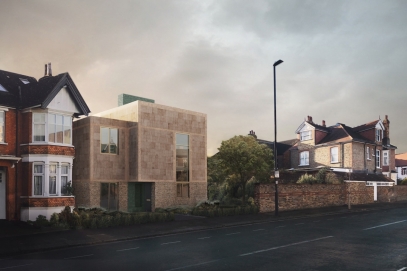Skene Catling de la Peña

Charlotte Skene Catling and Jaime de la Peña founded Skene Catling de la Peña, an architecture practice based in London and Madrid, in 2003. They take a unique approach that they call ‘Geoarcheology’, seeking to excavate meaning from context as a means of developing architecture. This involves transforming observations about the composition of the earth, historical artefacts and the cultural landscapes of their commissions. There is a strong emphasis on research and collaboration throughout their projects that leads to the rigorous exploration of ideas and possibilities at all scales from concept to detail and enters adjacent disciplines such as film and fine art. This has led to numerous collaborations with artists, with direct engagement to realise new work. They are particularly interested in innovative and unconventional uses of traditional materials in new contexts, and ways in which this can define a new approach to sustainability.
Skene Catling de la Peña are particularly interested in innovative and unconventional uses of traditional materials in new contexts, and ways in which this can define new approaches to sustainability.

Cube Haus © courtesy of Skene Catling de la Peña
One area of their recent work has focused on using a technologically refined reinvention of the masonry stove which burns waste material - in this case, coffee grounds - as the central core for prefabricated houses for small, awkward sites (the Cube Haus project has been published in the national UK press). This has involved research into burning technologies; the sustainable storing, reusing and redirecting of heat output and the conversion of heat into electricity which can be stored for later use.
Skene Catling de la Peña collaborate regularly with Adam Lowe and Factum Foundation on the public exhibitions of their work that merges technology and cultural preservation major exhibitions for institutions such as 'THE VERONICA SCANNER: LIVE 3D PORTRAITURE' at the Royal Academy, London, ‘Scanning Seti: The Regeneration of a Pharaonic Tomb’ at the Antikenmuseum Basel, and ‘Madame de Pompadour in the Frame’ at Waddesdon Manor. They are currently designing a permanent gallery in a Grade II listed building for the display of 17th century Spanish art and architecture in Bishop Auckland (as part of The Auckland Project, to open in 2021) and on converting the 16th century building in Seville in which the painter Diego Velazquez was born into a Museum and Interpretation Centre for the general public (the Casa Natal de Velázquez, to open in 2022). They worked together to try to save the Whitechapel Bell Foundry in London, England’s oldest manufacturing company, and to return a working 21st century foundry to this internationally important heritage site.
Skene Catling has written about architecture in The Burlington Magazine, The Architectural Review and ARCH+, and in 2018 she and Adam Lowe wrote a monthly column for DOMUS magazine. She launched the architectural film festival, ArchFilmFest, in London in 2017. She ran a post-graduate architecture unit at the Royal College of Art for five years, taught at the Karlsruhe Institute of Technology (KIT), Germany and is an Ambassador for the London School of Architecture (the LSA). She lectures in the UK and abroad and for the last five years she has been on the jury of the World Architecture Festival (WAF), an international festival and awards ceremony dedicated to the architecture industry and held in different host countries annually.
Skene Catling de la Peña are experienced in the design and integration of contemporary projects into Grade I and II listed buildings, and in creating interventions within sensitive historic contexts. Recent work includes the Flint House for Jacob Rothschild which was ‘extruded’ from the Buckinghamshire landscape of the Grade I listed Waddesdon Manor estate, Buckinghamshire, in strata of flint and chalk with the appearance of a natural, geological form. This building won the RIBA ‘House of the Year’ for 2015. They are currently building on the grounds of a Grade I listed Elizabethan North Mymms Park, Hertfordshire. Their work on Fidelio, a site-specific Opera at the Perm World Heritage Site, Russia was awarded the Perm Prize for Arts and Culture in 2011. In 2016, Charlotte Skene Catling was the only European shortlisted for the Architectural Review Women in Architecture award. Skene Catling de la Peña has won many awards for its approach and has been extensively published internationally.